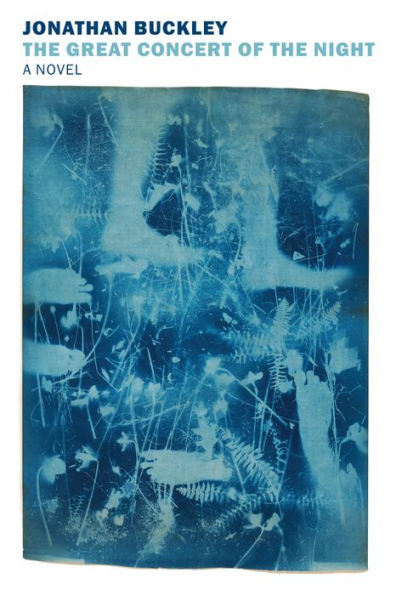“Memory: the background noise of the sensory world, sometimes barely audible, but always there. Making sentences of it, we amplify the signal, introducing distortion.”
Terse observations and melancholy recollections fill the notebook of David, a curator at the sparsely attended Sanderson-Perceval Museum in southern England where scientific and historical obscurities are displayed for a diminished audience. His entries describe the uneventfulness of his day, but most often recall moments spent with Imogen, an actress who visited the museum one day and with whom David enjoyed a brief relationship thereafter. The Great Concert of the Night, Jonathan Buckley’s beguiling tenth novel, is itself like the museum: an occasion for speculation, reflection, distraction, and aimless wonder. David’s narrative unspools over the course of one year; perhaps he is in his early sixties. He turns events over in his hands, as if examining the remaining artifacts before installing them with brief captions behind glass.
 The novel also shares attributes with Le Grand Concert de la Nuit, the disquieting film starring Imogen that David returns to time and again. On page one, he says that the movie “transmits a presence that both consoles and torments.” So does this novel. Its penetrating observations and correspondences generate pleasure: layers of experience resonate with history while illuminating the eternity of the moment. Torment: the perceptions and impulses, of Imogen in particular, point toward the dark end-game of Ecclesiastes, the vanity of aspiration and the fate of the body. The past, in the form of the museum, faces closure. Memory is a fever of distortion. When David notices Imogen alone in one of the museum’s galleries, she is gazing at a collection of aborted fetuses.
The novel also shares attributes with Le Grand Concert de la Nuit, the disquieting film starring Imogen that David returns to time and again. On page one, he says that the movie “transmits a presence that both consoles and torments.” So does this novel. Its penetrating observations and correspondences generate pleasure: layers of experience resonate with history while illuminating the eternity of the moment. Torment: the perceptions and impulses, of Imogen in particular, point toward the dark end-game of Ecclesiastes, the vanity of aspiration and the fate of the body. The past, in the form of the museum, faces closure. Memory is a fever of distortion. When David notices Imogen alone in one of the museum’s galleries, she is gazing at a collection of aborted fetuses.
The Great Concert of the Night is a braiding of obsessions. The most prominent and tensile of the strands are the episodes with Imogen. We soon learn she had been operated on for cancer. Her relationship to her own ailing body, now departed, triggers an array of thoughts and references – from the bodily negations of Simone Weil to Saint Teresa’s mortification of the flesh. He writes, “Each role was to an extent an alias, but at time, she said, she felt that her own self was an alias: Imogen Gough was a role, and she had no idea who was playing her. Every time we speak, we assume a character; the words are our costume.” If she radiates ideas, he absorbs and collects them – yet he, too, is aware of his staged persona: “The tour is always a performance. Conducting visitors around the museum, I am more voluble than my ordinary self, as I am in writing this.”
David’s expression isn’t exactly toneless, but it is certainly in harness, reserved – even though he regards his writing-self as voluble. He creates subtle tension and reveals attitude through juxtaposition. For instance, there are his recorded dialogues Val, the partner of his former wife Samantha, whose taste for life coaches, self-help routines and the cant of personal branding – all noted without David’s assessment – clash with Imogen’s blunt, mordant and often painfully gorgeous remarks. There is also William, a homeless man whom David and Imogen meet in the park. David goes on to note William’s various jobs and hopes, especially his faith in ultimately winning the love of a woman he encounters while making a delivery. William’s dogged pursuit raises questions about the quality of David’s ardor.
In crucial ways, The Great Concert of the Night is built and progresses like Mathias Énard’s Prix Goncourt-winning novel Compass and it is just as brilliant. Each narrator speaks discursively from a position of lack and loss, in a world stocked and strewn with cultural artifacts. Although the novels may be tagged, too easily, as post-modern in form, they are profoundly classical in their concerns and conception of humanity. Plot is secondary to the layering and collision of impressions; the reader is a collaborator, not a passive receptacle of conclusions. There is no fear of nostalgia. “Plot is not of overriding importance in my work. On the contrary: I am an episodic rather than a narrativist writer,” Buckley said in a 2015 article in The Guardian, also asserting that conceiving our lives as continuous narratives is not always the most useful or gratifying way of describing or imaginatively organizing our experiences. The ultimate subject of The Great Concert of the Night is the density of experience itself, not how we glean insight over time in order to attain the supposed goals of maturation.
 Compared to Énard, Buckley seems to exert an extra degree of control over his materials and the accretion of evidence they present about human desire, its disturbances and disturbing outcomes. Buckley has achieved a form that vibrates with those disturbances while maintaining exquisite poise – the illusion of integration, or at least a numinous pattern, in a world comprising discrete, unblendable elements. The director of Imogen’s movies, Antoine Vermeiren, is criticized by David because he “believes, I suspect, that his creativity transcends any considerations of mere technique.” Buckley wants things both ways: like Vemeiren, he enjoys certain excesses, and like the philosophers David cites, he speaks with measured clarity.
Compared to Énard, Buckley seems to exert an extra degree of control over his materials and the accretion of evidence they present about human desire, its disturbances and disturbing outcomes. Buckley has achieved a form that vibrates with those disturbances while maintaining exquisite poise – the illusion of integration, or at least a numinous pattern, in a world comprising discrete, unblendable elements. The director of Imogen’s movies, Antoine Vermeiren, is criticized by David because he “believes, I suspect, that his creativity transcends any considerations of mere technique.” Buckley wants things both ways: like Vemeiren, he enjoys certain excesses, and like the philosophers David cites, he speaks with measured clarity.
We learn much more about Imogen than David – her childhood, her other lovers, her opinions on various topics, her work, her psyche. At one point, David records one of her dreams: “Imogen and her mother were talking to each other, seriously, at length, and that conversation would culminate with her mother using a word that sounded French, but which Imogen had never heard before … the word always struck Imogen, in the dream, as being a sound that fitted the idea or the object perfectly, just as the song of a bird belongs to the bird. When she woke up, however, the word was no longer there. She had only the sense that something wonderful had been revealed to her, momentarily.”
One assumes, without declarations from David, that his passion for Imogen, and the effect of her aura on him, represent the culmination of his adult life. Something had been revealed to him – nothing less than the tussle between the sacred and the profane. He senses the forces at odds in his memory, the not-quite-suppressed quaking within himself parceled into episodes. It’s a stunning performance. If the Sanderson-Perceval must be shuttered, David will erect something else, something similar. David quotes: “’To be full of things is to be empty of God. To be empty of things is to be full of God.’ Again Meister Eckhart.” David/Buckley have achieved an exemplary sleight of hand – a text, empty and full at once. This superb novel generates that strangely familiar sensation that something wonderful has been revealed, momentarily.
[Published by New York Review Books on January 14, 2020, 304 pages, $15.95 paperback]